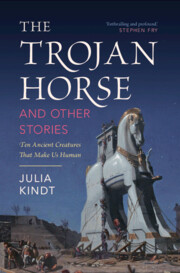‘Julia Kindt has found a miraculous new lens through which to scrutinise our oldest, most loved stories and find in them colours, shapes and qualities that we have never really seen before. Humankind's relationship with animals has been examined through archaeology, history and art, but never before, to my knowledge, through myth, legend and story. The insights that this absorbing and imaginative approach reveal are enthralling and profound. The stories are told with wit, imagination and sparkle; the animals who star in them brought wondrously to life.'
Stephen Fry
‘Kindt's wide-ranging volume tackles a question seldom addressed in the ever-expanding literature of ancient animal studies: how do non-human animals make us human? Investigating this question through an examination of ten animals and animal types that appear in classical mythology and history and live on in recent literature and art, she offers fresh insights on issues central to ancient animal studies, including the nature of animal intellect and emotion, the ethical obligations of human beings toward other species, and the significance of hybridity and metamorphosis. Kindt's scrupulously researched yet highly readable text will prove informative and stimulating to classical scholars and non-specialists alike.'
Stephen T. Newmyer - Duquesne University
‘In this beautifully written and timely book, Julia Kindt provides a fascinating account of how humans use real and imaginary animals to think about what it means to be human and an eloquent defence of the power of storytelling. With each of its chapters comparing classical and modern sources in innovative, accessible and engaging ways, The Trojan Horse and Other Stories is sure to start an important conversation about how the ancient world foreshadows our contemporary consideration of the human-animal relation.'
Chris Danta - Australian National University
‘The stories from ancient Greece are foundational for all our imaginations – and they are some of the best and long-lasting stories we have! Julia Kindt is a wonderful guide to what they are, what they mean and how they have influenced us.'
Simon Goldhill - University of Cambridge
‘Deeply insightful and erudite … Highly recommended for both disciples and skeptics of classics.'
Evan M. Anderson
Source: Library Journal (starred review)
‘A truly thought-provoking book and a delight to read. It is addressed to the intelligent and educated reader, rather than to a handful of fellow specialists. The scholarship is extensive and thoroughly but discreetly referenced, so that it is easy to follow up any leads of particular interest. Although most of Kindt’s readers will no doubt have some familiarity with many or all of the subjects she deals with, she never takes this for granted. Above all, she does not approach the past, as so often today, with an agenda or a set of judgements formed in advance of studying the material - in other words prejudices - but instead adopts a truly hermeneutic method, seeking first to understand what these stories and themes meant in their own time and, on that foundation, pursuing their subsequent history and their resonance for us today.’
Christopher Allen
Source: Australian Book Review
‘… if we go beyond philosophy to storytelling, suggests Julia Kindt in her sparky and stimulating book for the general reader, we can uncover a richer understanding of how animals have been used to shape ideas of what it means to be human.’
Helen Morales
Source: Times Literary Supplement
‘Kindt writes lucidly and with a splendid verve that erupts in the occasional, lively and well-timed pun. The narrative is also richly illustrated with numerous images. I enjoyed reading and learning from this book and recommend it with enthusiasm.’
James J. Clauss
Source: Bryn Mawr Classical Review



